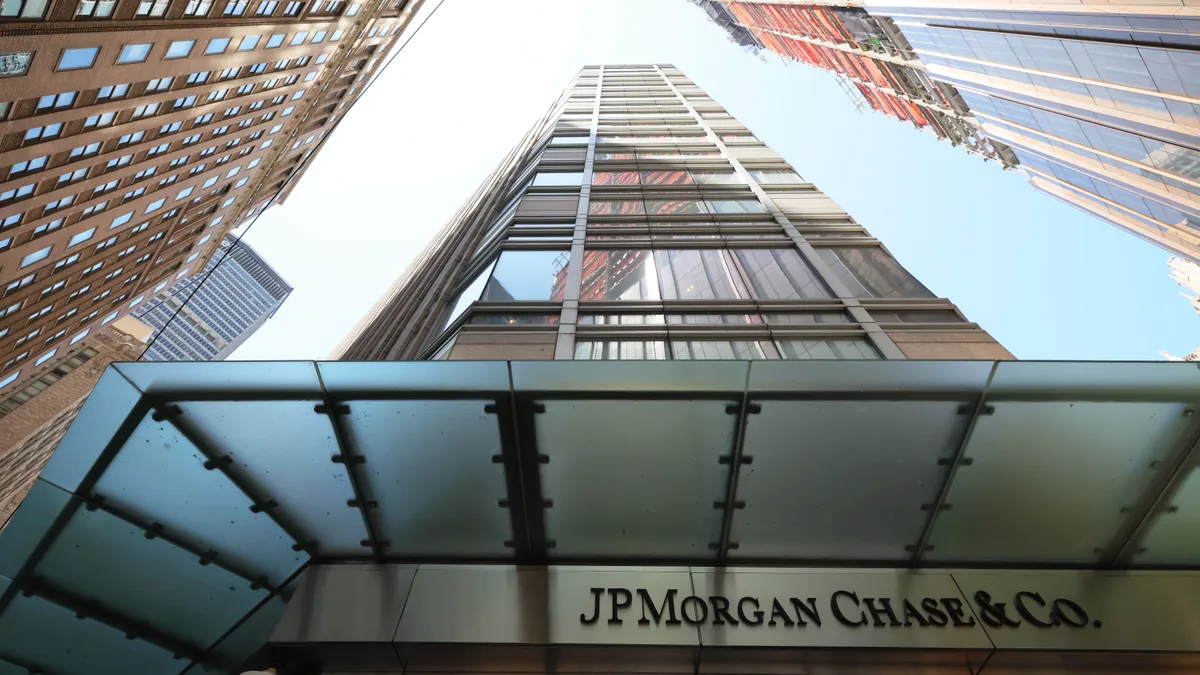Dive Brief:
- JPMorgan Chase shareholders voted down a proposal to split the CEO and chairman roles during the company’s annual meeting Tuesday, following the same outcomes at Bank of America and Goldman Sachs.
- However, the proposal garnered support from 42.7% of JPMorgan shareholders — notably more than the 33% of Goldman Sachs voters and 31% of Bank of America voters that backed similar measures at those banks’ annual meetings.
- JPMorgan had urged shareholders to reject the proposal to separate the two roles and appoint an independent board chair, while proxy advisers Institutional Shareholder Services and Glass Lewis had recommended voters support the proposal.
Dive Insight:
The push to separate the two roles has gained steam in recent years amid broader efforts to enhance companies’ corporate governance.
Jamie Dimon occupies both roles at the largest U.S. bank, and the New York City-based lender plans to split those duties once Dimon, who has led JPMorgan since 2006, steps down, according to its annual proxy statement. It won’t require that the board chair be independent, though.
The company’s board believes that approach “best serves the Firm and its shareholders as it focuses on enabling an orderly CEO transition to take place in the medium-term,” JPMorgan said in a May 13 response to ISS’s recommendations. During the bank’s investor day Monday, Dimon, 68, acknowledged succession planning is well underway, and his retirement time frame “isn’t five years anymore.”
To Wells Fargo analyst Mike Mayo, the level of support the proposal received Tuesday was “bewildering and baffling,” based on the bank’s recent performance, American Banker reported.
Although Mayo said he favors strong corporate governance and shareholder rights, watering down Dimon's role is “the wrong playbook for the wrong person at the wrong time,” he told American Banker. Mayo predicts Dimon will spend about 2½ more years as the bank’s CEO before stepping down from that post and becoming executive chair.
ISS had recommended voters support the shareholder proposal because “the size and complexity of JPMorgan suggests that it is difficult for any one person to run both the company and the board.”
The bank, however, countered that in the letter by saying “this fails to match the empirical evidence of the last 18 years of leadership by the current Chairman and CEO that has seen the Firm become the largest U.S. bank, outperforming our peers including those with independent chairs.”
In his 60-page annual shareholder letter, Dimon himself argued there’s no evidence that separating the roles is favorable.
The bank also said shareholders “have demonstrated overwhelming support” for Stephen B. Burke, the board’s current lead independent director; he’s received more than 90% of shareholder votes for each election during his tenure, JPMorgan noted.
Kenneth Steiner, who submitted the proposal to split the CEO and chair roles, had argued Burke isn’t “independent” because he’s been there about two decades.
Proposals to split the CEO and board chair roles have been voted on at JPMorgan’s last four annual meetings, receiving support from between 37% and 47.5% of voters, American Banker reported.
Dimon has been vocal about what he sees as the excessive influence of proxy advisers such as ISS and Glass Lewis. In his shareholder letter, Dimon called out “the spiraling frivolousness” of annual shareholder meetings, which have turned into a “showcase of grandstanding and competing special interest groups.”
Also at Tuesday’s meeting, JPMorgan shareholders rejected a proposal that would have had the bank seek shareholder approval when offering senior managers new or renewed pay packages.
The lender had asked shareholders not to support the proposal, saying it doesn’t provide such “golden parachute” agreements, referring to lucrative pay or benefits executives receive in the event they’re terminated. Still, 40.7% of the bank’s shareholders voted in favor of the proposal.











